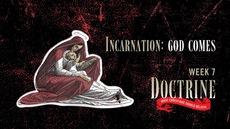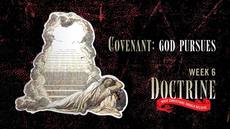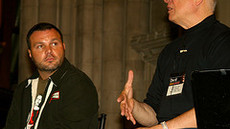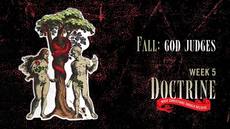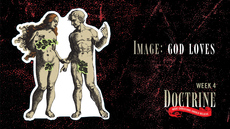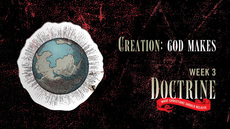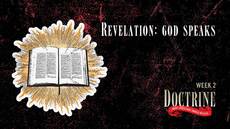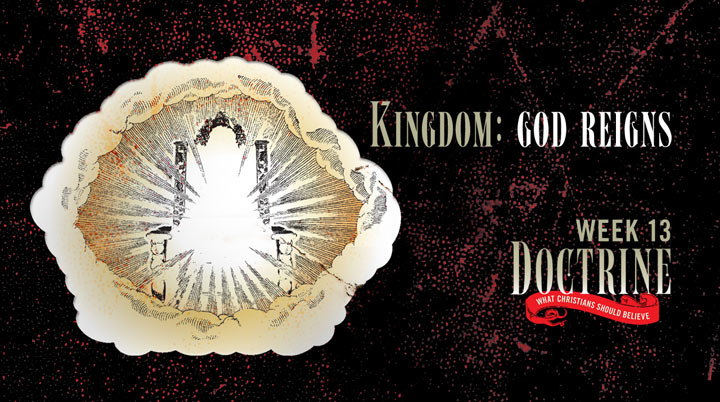
Something has gone terribly wrong with the world. Everyone who has ever hoped in a politician, gotten sick, wept at injustice, become angry at evil, tried to help someone, or just felt like giving up knows it and despite all the wars that have been fought, money that has been spent, and good works done in the history of the world sin, death, evil, tyranny, sickness, poverty and the like continue to reign and will to varying degrees until the Kingdom of God is fully established on the earth.
In the Doctrine: What Christians Should Believe series week 3 we studied how God made the heavens and the earth in perfection, and in week 4 we studied how God made us male and female in his image and likeness. In week 5 we studied how sin has stained, tainted, marred, and affected all of creation – every person and thing that is made. In weeks 7-9 we then studied how God came into history as the man Jesus Christ to defeat sin at the cross and triumph over it through his resurrection to usher in a new world through his victory. This week, as the final sermon in the Doctrine series, we will study the kingdom of God.
In so doing, you will see that the Bible is in many ways a beginning – middle – beginning story. Unlike many of our western stories told in beginning – middle – end fashion, the Bible is more eastern in its storyline. As we have traced the storyline of the Bible to its culmination in God’s eternal kingdom we see that the story begins Genesis with God creating in perfection, human beings sinning against God, humanity and creation suffering the effects of sin, and God punishing sin which includes casting sinners away from the tree of life, and pursuing sinners in love. In the closing chapters of Revelation which conclude the Bible we see God’s final judgment upon sinners, final cleansing of all creation from the effects of sin, and God renewing and expanding his creation intentions with humans receiving resurrected glorified bodies patterned after Jesus, a new heaven, a new earth, and the return of the tree of life.
To better understand the Kingdom we will answer some of the more common questions regarding it.
What are some false views of the afterlife?
There are many false views of the afterlife with contradict the Bible’s teaching about the kingdom. While each could merit more lengthy study, for the purpose of brevity I will explain each briefly.
Universalism teaches that in the end, everyone will wind up in heaven forever and that no one will spend eternity in hell. Annilationism teaches that no one will spend forever in hell as in the end they will simply cease to exist at some point following death. But Daniel 12:2 refutes both saying, "And many of those who sleep in the dust of the earth shall awake, some to everlasting life, and some to shame and everlasting contempt." Simply, Daniel says that Christians will be in heaven just as long as non-Christians will be in hell; forever. Furthermore, Jesus speaks of hell more than anyone else in the Bible and is clear that not everyone will be saved when speaking of the eternal life he offers as a narrow path on which few travel and narrow gate through which few pass.
Both reincarnation and purgatory say that there is further opportunity for salvation following death. Hebrews 9:27 refutes both possibilities saying "…it is appointed for man to die once, and after that comes judgment…"
"Soul Sleep" is the teaching that following death our body and soul both lie dormant until the resurrection of the dead. Philippians 1:21-23 refutes this by saying, "For to me _to live is Christ, and to die is gain. If I am to live in the flesh, that means fruitful labor for me. Yet which I shall choose I cannot tell. I am hard pressed between the two. My desire is to depart and _be with Christ, for that is far better."
Lastly, perhaps the most commonly held false view of the afterlife is that we will never again occupy physical bodies and live a physical existence. This is perhaps most commonly seen as the cartoon picture of heaven where people sit around on cottony clouds in diapers with little wings strumming little harps which seems more hellish than heavenly.
The Bible teaches that we are both material body and immaterial soul that are united in this life. For Christians, following death the body and soul are separated so that while our body rests in the grave our soul goes to be with Jesus (2 Corinthians 5:8). One day the body and soul of Christians will be rejoined upon our resurrection patterned after Jesus resurrection (1 Corinthians 15). For non-Christians, following this life their body rests in the grave while their soul goes to a place of just punishment called Hades where conscious eternal torment is experienced until their body and soul are rejoined for final sentencing into the endless pain of hell (Revelation 20:13-14). Jesus speaks of the fact that all people will rise for a physical eternal life in John 5:;25-29 saying, "Truly, truly, I say to you, an hour is coming, and is now here, when the dead will hear the voice of the Son of God, and those who hear will live. For as the Father has life in himself, so he has granted the Son also to have life in himself. And he has given him authority to execute judgment, because he is the Son of Man. Do not marvel at this, for an hour is coming when all who are in the tombs will hear his voice and come out, those who have done good to the resurrection of life, and those who have done evil to the resurrection of judgment."
Who is the king?
Because a kingdom is equivalent to the jurisdiction to the rule of a king, before proceeding to examine the Kingdom we must first establish who the King is. Of course, the King is Jesus. It as prophesied of him in Genesis 49:10 that he would rule with a king’s _scepter, in Matthew 21:25 we read of Jesus coming as the humble King writing a donkey, and when his enemies pressed a crown of thorns into his head they were in fact revealing the truth despite their mockery. Following his resurrection and ascension to heaven Jesus is revealed throughout Revelation to be seated upon a throne ruling and reigning as sovereign Lord over all creation. And, in Revelation 17:14 we read of Jesus crushing of all other enemy kinds and kingdoms saying, "They will make war on the Lamb, and the Lamb will conquer them, for he is Lord of lords and King of kings, and those with him are called and chosen and faithful."
Richard Bauckham describes the theocentric vision of heaven depicted in Revelation 5: "In this worship of God and the Lamb by the whole creation (Revelation 5:13) the eschatological goal of God’s purpose for His creation is already anticipated. Appropriately, therefore, the living creatures, who continually express creation’s worship with this goal in view, join their own ‘Amen!’ to it when the goal is reached. (5:14). It is worth noticing how far from anthropocentric is this vision of worship. Humanity is radically displaced from the center of things where human beings naturally tend to place themselves. At its heart and in its eschatological goal the creation is theocentric, orientated in worship towards its Creator." (Richard Bauckham, The Theology of the Book of Revelation (Cambridge: Cambridge University Press, 1993), 33.) Simply, the vision of the closing book of the Bible is Jesus as King ruling over all creation and receiving all glory.
What is God’s kingdom?
Sadly, some poor teachers are prone to reduce the kingdom of God to simply good works done to help the poor and needy, or merely the Christian church. The kingdom of God includes the church, and the church is commanded in Scripture to do good works and help those in need as demonstrations of gospel grace and mercy. But, the kingdom is bigger than aspects of the kingdom such as these. Dr. Gerry Breshears and I deal with this issue in our forthcoming book Vintage Church due for release at the end of January and available for presale at Re:Lit and the following is a quote from that yet unfinished manuscript that is undergoing editorial revision,
"In recent years many theologians have come to a consensus that the kingdom is to be thought of as the reign of God and the exercise of his authority. The church, by contrast, is a realm of God, the people who are under his rule. George Eldon Ladd, a leader in forging the consensus, says, "The church is the community of the Kingdom but never the Kingdom itself." (George Eldon Ladd, A Theology of the New Testament, Eerdmans; Revised Edition, 1993, p. 109.) This consensus is called inaugurated eschatology, the idea that the kingdom is both here now in some senses and still to come in its fullness. Some connect church and kingdom too closely, believing the kingdom is here in its fullness now. This is called an over realized eschatology which virtually identify kingdom and church as many Roman Catholics and some amillennialists do. Others see the kingdom exclusively future, something Jesus will establish when he returns. This is an under realized eschatology which disconnects kingdom and church completely as in older dispensational premillennialism. God’s kingdom work is the dynamic activity of the sovereign, triune God to manifest His authority in His sin-alienated creation, by redeeming it from the domain of evil, judging all enemies, and bestowing the blessings of His reign on and through His people to the praise of His glory. The relation between kingdom and church can be summarized in a seven basic points:Practically, this world still has sin, sinners, the devil and demons, but does not yet have Jesus ruling on the earth with a rod of iron (Psalm 2:9: Revelation 2:26; 12:5; 19:15). Subsequently, a naively optimistic over realized eschatology that thinks we can fix all of the world’s problems and usher in utopia is an extreme error. Conversely a gloomy pessimistic under realized eschatology that thinks we can’t make a difference in the world as the church by the power of the gospel is also an extreme error. This tension of the kingdom being already present in the church but not yet fully unveiled with the return of Jesus allows us to labor in hope until he returns by working on both the spiritual and physical needs of people which includes caring for the whole person including their food, shelter, education, water, clothing, etc. " According to the Tyndale Bible Dictionary the Kingdom of God (or Kingdom of Heaven as it is sometimes referred to in Scripture) is, The sovereign rule of God, initiated by Christ’s earthly ministry and consummated when the kingdom of the world becomes the kingdom of our Lord and of his Christ (Rv 11:15). According to the testimony of the first three Gospels, the proclamation of the kingdom of God was Jesus’ central message. Matthew summarizes the Galilean ministry with the words "Jesus traveled throughout Galilee teaching in the synagogues, preaching everywhere the Good News about the Kingdom" (Mt 4:23, nlt). The Sermon on the Mount is concerned with the righteousness that qualifies people to enter the kingdom of God (5:20). The collection of parables in Matthew 13 and Mark 4 illustrate the "mystery" of the kingdom of God (Mt 13:11; Mk 4:11). The establishment of the Lord’s Supper looks forward to the establishment of the kingdom of God (Mt 26:29; Mk 14:25). The NT reports two different forms of the expression: "the kingdom of God" and "the kingdom of the heavens." The latter is found only in Matthew, but Matthew also has "the kingdom of God" four times (Mt 12:28; 19:24; 21:31, 43). "The kingdom of heaven" is a Semitic phrase that would have been meaningful to Jews but not to Greeks. The Jews, out of reverence for God, avoided uttering the divine name, and contemporary literature gives examples of substituting the word "heaven" for God (1 Macc 3:18, 50; 4:10; see Lk 15:18). The key to an understanding of the kingdom of God is that the basic meaning of the Greek word basileia, as also of the Hebrew malkut, is rule, reign, dominion. We frequently find in the OT the expression "in the year of the kingdom of …," meaning in the year of the reign of a given king (e.g., 1 Chr 26:31; 2 Chr 3:2; 15:10; Ezr 7:1; 8:1; Est 2:16; Jer 10:7; 52:31). When we read that Solomon’s kingdom was firmly established (1 Kgs 2:12), we are to understand that his authority to reign was settled. To "turn the kingdom of Saul over to [David]" (1 Chr 12:23, kjv) indicates that the authority that had been Saul’s was given to David. As a result of having received legal authority, David became king. This abstract idea of malkut is evident when it is found in parallelisms with such ideas as power, might, glory, and dominion (Dn 4:34; 7:14). When malkut is used of God, it almost always refers to his authority or to his rule as the heavenly King. "They will talk together about the glory of your kingdom; they will celebrate examples of your power …. For your kingdom is an everlasting kingdom. You rule generation after generation" (Ps 145:11, 13, nlt). Further, if a king rules, there must be a realm or sphere over which he reigns. This is also called malkut. "So the realm of Jehoshaphat was quiet, for his God gave him rest round about" (2 Chr 20:30, rsv; see Est 3:6; Jer 10:7; Dn 9:1; 11:9). This same twofold use of basileia is found in the NT. In fact, basileia could be translated by the expression "kingly power" in Luke 23:42 (niv mg) and by "kingship" in John 18:36. When a nobleman went into a far country to get a "kingdom" (Luke 19:12, nasb) he went to the governing authority to get an appointment as king. When Jesus said, "My kingship is not of this world" (Jn 18:36, rsv), he did not mean to say that his rule has nothing to do with the world but rather that his kingship—his dominion—does not come from man but from God. Therefore, he rejects the use of worldly fighting to gain his ends. This central meaning of basileia makes it easy to understand many sayings in the Gospels. In the Lord’s Prayer the petition "Thy kingdom come" (Mt 6:10) is a prayer for God to manifest his reign so that his will may be done on earth as it is in heaven. When we read that we are to "receive the kingdom of God like a child" (Mk 10:15, rsv), we must open our hearts and lives to the rule of God. Also in the NT are sayings about being in the kingdom or of entering the kingdom (Mt 8:11; Mk 9:47; 10:23–25; Lk 13:28). There is no philological or theological objection to understanding "the kingdom of God" first as the divine reign or rule and second as the sphere of blessing in which that reign is experienced. Walter A. Elwell and Philip Wesley Comfort, Tyndale Bible Dictionary, Tyndale reference library (Wheaton, Ill.: Tyndale House Publishers, 2001). 775.
- Jesus, who came as king, inaugurated his kingdom in the New Covenant (Acts 2:16-21) and in the Church (Acts 2:41-47).
- Jesus spoke of a coming kingdom (Mark 13; Luke 19:12-27; 21:5-38; Acts 1:6-7)
- Jesus is now in heaven as anointed king; He will appear as reigning king (Acts 3:20-21; 13:33-41)
- Believers are faithful members of the present and coming kingdom (John 14:14-16; Rom. 8:19-21; 1 Cor. 7:29-31; Phil. 3:20; 1 Pet. 2:11)
- The church witnesses to the present and coming kingdom (Acts 1:3-8; 8:12; 19:8; 28:23, 31).
- Church is an outpost, a parable, a forerunner, the first fruit of the coming kingdom
- The church does battle against the kingdom of darkness using the weapons of Light (Rom. 13:12; 2 Cor. 6:7; 10:4-5; Eph. 6:10-20; 1 Thess. 5:8)
How is God’s kingdom manifest in hell?
Jesus speaks of hell more than anyone else in the Bible. Furthermore, eleven of the twelve occasions that hell is spoken of as Gehenna in the New Testament are on the lips of Jesus.
The Baker Encyclopedia of the Bible explains Gehenna saying,
English transliteration of the Greek form of an Aramaic word which in turn is derived from the Hebrew phrase "the Valley of [the son(s) of] Hinnom." The name properly designates a deep valley delimiting the territories of the tribes of Benjamin and Judah (Jos 15:8; 18:16). It is commonly identified with the W?di er-Rab?bi which runs from beneath the western wall of the Old City, forming a deep ravine south of Jerusalem. The place became notorious because of the idolatrous practices which were carried out there in the days of Judah’s kings Ahaz and Manasseh, especially involving the heinous crime of infant sacrifice associated with the Molech ceremonies (2 Kgs 16:3; 21:6; 2 Chr 28:3; 33:6; Jer 19:56; 32:35). The spiritual reformation of King Josiah brought an end to these sinister proceedings (2 Kgs 23:10). The prophet Jeremiah referred to the valley in picturing God’s judgment upon his people (Jer 2:23; 7:30–32; 19:5, 6)… Subsequently, the valley appears to have been used for the burning of the city’s refuse and the dead bodies of criminals. Interestingly, a well-established tradition locates the scene of Judas’ suicide and the consequent purchase of the Potter’s Field on the south side of this valley. The ravine’s reputation for extreme wickedness gave rise, especially during the intertestamental period, to use of its name as a term for the place of final punishment for the wicked (Enoch 18:11–16; 27:1–3; 54:1 ff.; 56:3, 4; 90:26; 2 Esd 7:36; cf. Is 30:33; 66:24; Dn 7:10). Jesus himself utilizes the term to designate the final abode of the unrepentant wicked (Mt 5:22; 10:28; 18:9). Since Gehenna is a fiery abyss (Mk 9:43), it is also the Lake of Fire (Mt 13:42, 50) to which all the godless will ultimately be consigned (23:15, 33), together with Satan and his hosts (Mt 25:41; Rv 19:20; 20:10, 14, 15). Gehenna must be carefully differentiated from other terms relative to the afterlife or final state. Whereas the OT "Sheol" (cf. NT "Hades"), uniformly designates the temporary abode of the lost between death and resurrection when referring to the place of the departed spirit of man, "Gehenna" specifies the final place where the wicked will suffer everlasting punishment (cf. Ps 49:15, 16 with Mt 10:28). "Tartarus" occurs only in 2 Peter 2:4 and identifies the particular abode of the angels who fell in the primeval satanic revolt.(Walter A. Elwell and Barry J. Beitzel, Baker Encyclopedia of the Bible (Grand Rapids, Mich.: Baker Book House, 1988). 844)
Wayne Grudem defines hell as follows: "Hell is a place of eternal conscious punishment for the wicked." (Wayne Grudem, Systematic Theology (Grand Rapids: Zondervan, 1994), 1148.) Grudem also observes that the denial of the traditional view of hell often indicates a movement away from orthodoxy. "Because the doctrine of eternal conscious punishment is so foreign to the thought patterns of our culture, and, on a deeper level, to our instinctive and God-given sense of love and desire for redemption for every human being created in God’s image, this doctrine is emotionally one of the most difficult doctrines for Christians to affirm today. It also tends to be one of the first doctrines given up to people who are moving away from a commitment to the Bible as absolutely truthful in all that it affirms. Among liberal theologians who do not accept the absolute truthfulness of the Bible, there is probably no one today who believes in the doctrine eternal conscious punishment." (Wayne Grudem, Systematic Theology (Grand Rapids: Zondervan, 1994), 1151, n. 16.)
In the closing chapter of our book Vintage Jesus Dr. Gerry Breshears and I spoke of hell in this way:Not only will Jesus judge with perfect justice, he will also sentence the unrepentant to perfectly suited punishment in hell for their sins. (Eccl. 12:14; Matt. 12:36; Luke 12:2–3, 47–48; 20:47; Rom. 2:5–7; Rev. 20:12–13) Some who wince at the doctrine and find it incompatible with the loving nature of Jesus may be surprised to discover that Jesus spoke of hell more than anyone in Scripture. (Matt. 8:11–12, 29; 13:40–42; 18:8–9; 22:13; 24:50–51; 25:30, 41, 46; Mark 9:43–48; Luke 12:46–48; 16:19–31) In fact, British philosopher Bertrand Russell said, "There is one very serious defect to my mind in Christ’s moral character, and that is that He believed in hell." (Bertrand Russell, Why I Am Not a Christian (New York: Simon & Schuster, 1957), 17) Tragically, unless he turned to Jesus before his death, Russell came to agree with Jesus, discovering in the most painful way that Jesus rules even in hell, over Satan, demons, and unrepentant sinners…(Rev. 14:9–11) God is literally holy, we are literally sinful, Jesus literally died to forgive our sin, and if we fail to receive his forgiveness, we will literally stand before him for judgment and be sentenced to a literal hell as an act of literal justice. To be honest, the doctrine of hell does not bother me. It makes perfect sense that guilty people would be sentenced and punished for their evil. What has always bothered me is heaven. How could a holy God allow any sinner to enter heaven? Furthermore, how could a loving God allow evil to continue without stopping it forever and bringing justice to all of the victims before wiping all their tears? Indeed, the joys of heaven and not the pains of hell are more difficult for me to reconcile with the character of a good God. The cold, hard truth is that for those who do not love Jesus, this life is as close to heaven as they will ever get. Hell awaits them.
Lastly, perhaps the most haunting verse regarding hell in all of Scripture is Revelation 14:10 which shows Jesus ruling and reigning over hell ensuring that Satan, demons, and sinners are punished as Scripture says "according to their work."
How is God’s kingdom manifest in heaven?
Both Revelation and Romans 8 speaks of the day when, finally and forever, the curse and its effects will be no more. Instead, following the resurrection of the dead there will be a new heaven and a new earth for God’s people to dwell in together forever as God’s physical heavenly kingdom.
The Tyndale Bible Dictionary speaks of the new heavens and the new earth saying it is,
"…first found in the book of Isaiah. God declares, "For behold, I create new heavens and a new earth; and the former things shall not be remembered or come into mind …. For as the new heavens and the new earth which I will make shall remain before me … so shall your descendants and your name remain" (Is 65:17; 66:22, rsv)… That God is Creator of the heavens and earth is basic to all biblical theology. "In ages past you laid the foundation of the earth, and the heavens are the work of your hands" (Ps 102:25, nlt). If God created the heavens and earth, then it is entirely appropriate that, once they have served their purpose, God may do with them what he wishes. "Even they will perish, but you remain forever; they will wear out like old clothing. You will change them like a garment, and they will fade away" (v 26, nlt). The same metaphor is found in Isaiah 51:6, which speaks of the earth wearing out like a garment. Scripture (quoted below from the nlt) gives considerable attention to the passing away of the old order, speaking of a future time when heaven and earth will disappear (Is 34:4; 51:6; Mt 24:35; Rv 21:1). A number of related phrases portray the same idea: "And this world is fading away" (1 Jn 2:17); "They [the heavens and earth] will wear out like old clothing" (Heb 1:11; cf. Ps 102:26; Is 51:6); "But the day of the Lord will come as unexpectedly as a thief. Then the heavens will pass away with a terrible noise, and everything in them will disappear in fire, and the earth and everything on it will be exposed to judgment" (2 Pt 3:10). This consummation by fire will take place at the time of final judgment. It will be "the day when God will set the heavens on fire and the elements will melt away in the flames" (v 12). This judgment, which brings to a close the old order, clears the way for new heavens and a new earth. Peter continues, "But we are looking forward to the new heavens and new earth he has promised, a world where everyone is right with God" (2 Pt 3:13). It will be so wonderful that no one will even remember the old (Is 65:17). Peter, preaching in Solomon’s Colonnade, says that Jesus will remain in heaven until the time comes for establishing all that God spoke by his holy prophets (Acts 3:21). This recovery or renewal is eagerly awaited by the created order. Paul writes, "For all creation is waiting eagerly for that future day when God will reveal who his children really are" (Rom 8:19) because "all creation anticipates the day when it will join God’s children in glorious freedom from death and decay" (v 21). The heaven that will be renewed is not the heaven of God’s presence, but the heaven of human existence, the starry expanse that constitutes the universe. In the book of Revelation we learn that the new Jerusalem comes down from heaven to earth (Rv 21:2, 10) and forms the eternal dwelling place of God and his people. The new earth will be a place of perfect righteousness (Is 51:6), divine kindness (54:10), eternal relationship to God (66:22), and total freedom from sin (Rom 8:21).Walter A. Elwell and Philip Wesley Comfort, Tyndale Bible Dictionary, Tyndale reference library (Wheaton, Ill.: Tyndale House Publishers, 2001). 949.
Beautifully, the Bible ends with God’s purposes for creation satisfied and expanded. Together forever with him in joy by grace is the resurrected kingdom longing of all who trust in Jesus.

